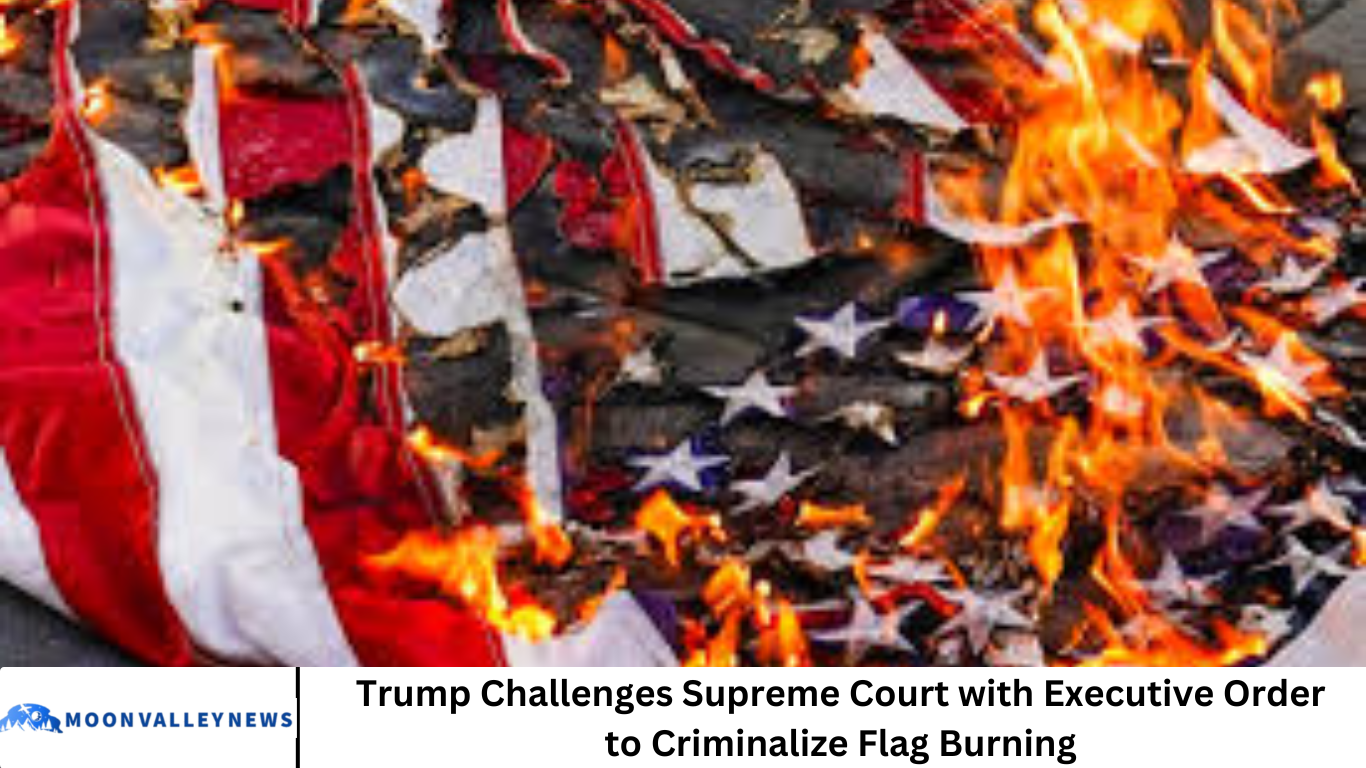In a controversial move reigniting a decades-long debate over free speech and patriotism, former President Donald Trump has signed an executive order instructing federal prosecutors to pursue criminal charges against individuals who burn the American flag during protests.
The decision challenges long-standing Supreme Court rulings protecting flag burning under the First Amendment and raises significant constitutional and political questions.
This article explores the implications of Trump’s executive order, the legal and historical background of flag burning in the United States, reactions from both sides of the political aisle, and what this means for free speech moving forward.
More Read: How to Refresh Your Mattress Without Expensive Products
Background of Flag Burning in the U.S.
Flag burning has long been a powerful symbol of protest in the United States, especially during times of political or social unrest. From the Vietnam War era to modern protests over racial injustice, the act of burning the American flag has been used to draw attention to perceived government failures.
Historical Context
- 1960s–1970s: Anti-war demonstrators burned flags in protest of the Vietnam War.
- 1980s–1990s: The issue reached the Supreme Court, culminating in landmark decisions affirming flag burning as protected speech.
Throughout this history, flag burning has consistently sparked public outrage, especially among those who see the American flag as a sacred national symbol.
The Supreme Court’s Stance on Flag Burning
Trump’s order appears to directly challenge two landmark Supreme Court rulings that protect flag burning as a form of free speech:
1. Texas v. Johnson (1989)
In a 5-4 decision, the Supreme Court ruled that flag burning constitutes symbolic speech protected by the First Amendment. The case involved Gregory Lee Johnson, who burned an American flag during the 1984 Republican National Convention in protest.
2. United States v. Eichman (1990)
This decision struck down the Flag Protection Act of 1989, reinforcing the notion that the government cannot prohibit expression simply because it is offensive or disagreeable.
Key Legal Principle: The government cannot suppress expression simply because it is unpopular or offensive.
Details of Trump’s Executive Order
On Monday, Donald Trump signed an executive order directing the Attorney General, Pam Bondi, to:
- Investigate flag burning incidents during protests.
- Explore prosecution under existing federal or state laws, such as:
- Disturbing the peace
- Environmental violations
- Public safety laws
Trump’s Statement
“You burn a flag, you get one year in jail,” Trump declared during the signing ceremony. While the order itself doesn’t mention prison sentences explicitly, the tone suggests a push for stricter enforcement and punitive consequences.
Lack of Legal Authority?
It’s important to note that an executive order cannot override a Supreme Court ruling. However, Trump’s directive is likely aimed at working around existing legal protections by using alternative statutes.
Legal Experts Respond
Many legal scholars and civil liberties advocates have expressed concern about the constitutionality of the order.
ACLU Statement
The American Civil Liberties Union (ACLU) released a statement condemning the order as:
“A blatant attack on free speech and a cynical attempt to politicize patriotism.”
Constitutional Law Professors Weigh In
- Prof. Laurence Tribe (Harvard Law School):
“This executive order is more political theater than legal action. It cannot withstand judicial scrutiny.” - Prof. Erwin Chemerinsky (UC Berkeley):
“The Supreme Court has been very clear. Flag burning is protected. Any effort to criminalize it will be struck down.”
Political Reactions to the Order
Republican Support
Many Republican lawmakers have expressed support, viewing the order as a defense of American values.
- Sen. Josh Hawley (R-MO):
“Our flag represents sacrifice and freedom. Burning it should never be tolerated.” - Rep. Marjorie Taylor Greene (R-GA):
“Finally, a president who respects our country and doesn’t tolerate anti-American hatred.”
Democratic Opposition
Democrats have largely condemned the move as unconstitutional and dangerous.
- Speaker Hakeem Jeffries (D-NY):
“Trump is attacking the Constitution he swore to uphold.” - Sen. Bernie Sanders (I-VT):
“We may not like flag burning, but in a free society, we must defend the right to dissent.”
Free Speech vs. Patriotism
The executive order has reignited the age-old debate: Where is the line between patriotic values and constitutional freedoms?
The Flag as a Symbol
To many Americans, the flag is a symbol of national pride, military sacrifice, and democratic ideals. Burning it is seen as deeply disrespectful.
Free Expression in a Democracy
However, freedom of speech—especially unpopular speech—is a cornerstone of American democracy. Suppressing it, even for symbols like the flag, opens the door to broader censorship.
“If we don’t protect speech we hate, we don’t protect speech at all.” – ACLU
Implications for the 2024 Election and Beyond
Trump’s order appears to be part of a larger strategy to energize his base ahead of the 2024 presidential election.
Appealing to Nationalists and Conservatives
By focusing on “law and order” and symbolic issues like the flag, Trump is reinforcing themes that resonate with:
- Veterans
- Rural voters
- Evangelicals
- Traditional conservatives
Diverting from Legal Troubles?
Critics argue the order is a distraction from Trump’s mounting legal issues, including ongoing investigations and indictments.
Social Media Reaction
The announcement has sparked a wave of reactions online, trending under hashtags like:
- #FlagBurningBan
- #FreeSpeech
- #TrumpExecutiveOrder
On X (formerly Twitter):
- @PatriotVetsUSA:
“Finally! Flag burning is a disgrace. Proud of Trump for standing up for America.” - @RightsMatter2024:
“Flag burning is speech. If Trump can criminalize that, what’s next?”
International Perspective
Other democratic nations also protect offensive or symbolic speech:
- Germany: Flag desecration can be punished under certain conditions but is rarely enforced.
- Canada and UK: Symbolic speech, including burning national symbols, is largely protected.
The U.S. remains unique in its strong legal protections for political expression, even when unpopular.
What’s Next?
Legal Challenges Likely
Civil rights organizations are already preparing lawsuits to block enforcement of the order. Legal observers expect:
- Immediate injunctions in federal courts
- Potential escalation to the Supreme Court
Political Ramifications
The issue is expected to feature prominently in upcoming debates and campaign rallies. Whether it helps or hurts Trump remains to be seen.
Frequently Asked Question
Is flag burning currently illegal in the United States?
No. As of now, flag burning is legal and protected under the First Amendment as a form of symbolic speech. This was affirmed by the Supreme Court in Texas v. Johnson (1989) and again in United States v. Eichman (1990). Any laws attempting to criminalize flag desecration have been struck down as unconstitutional.
What does Trump’s executive order on flag burning actually do?
Trump’s executive order does not create a new law criminalizing flag burning. Instead, it instructs the Attorney General to explore existing laws — such as those related to disturbing the peace or environmental violations — to prosecute individuals who burn American flags during protests.
Can an executive order override a Supreme Court decision?
No. An executive order cannot override a ruling by the U.S. Supreme Court. The Constitution grants the Supreme Court the power to interpret laws, and its decisions are binding. Trump’s order may attempt to work around these rulings, but it cannot legally contradict them.
Why is this issue controversial?
The issue of flag burning sits at the crossroads of free speech and patriotism. Supporters of Trump’s order view flag burning as a deeply offensive act against American values. Opponents argue that criminalizing it is a direct threat to constitutional freedoms and sets a dangerous precedent for limiting dissent.
What are legal experts saying about the executive order?
Most legal scholars agree that the executive order is unlikely to withstand legal scrutiny. Many view it as political theater rather than enforceable policy. The ACLU and other civil liberties groups have already signaled plans to challenge the order in court if prosecutions are attempted.
Has Congress ever tried to ban flag burning?
Yes. After the Texas v. Johnson ruling, Congress passed the Flag Protection Act of 1989, which was quickly struck down by the Supreme Court in United States v. Eichman. There have been several attempts to pass a constitutional amendment banning flag desecration, but none have succeeded.
Could this issue impact the 2024 election?
Yes. Flag burning and similar symbolic issues often become wedge topics during election years. Trump’s executive order may energize his conservative base, but it could also mobilize civil rights advocates and younger voters concerned about threats to free speech.
Conclusion
Trump’s executive order to criminalize flag burning represents a bold—and likely unconstitutional—challenge to long-standing legal precedent. While it may play well with parts of his political base, the move risks undermining foundational American freedoms. As the courts and public opinion weigh in, this controversy serves as a reminder that freedom of speech isn’t just about protecting what’s popular—it’s about protecting what’s unpopular, offensive, and controversial. In the end, the flag may be a symbol of America, but the First Amendment is its foundation.






